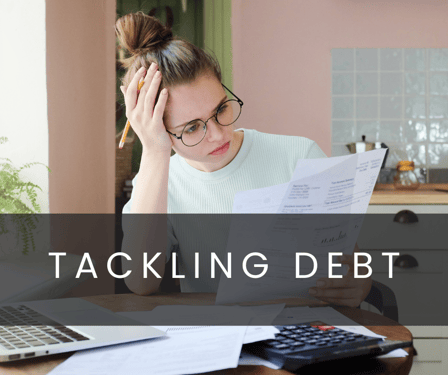"Having overwhelming card balances is something many people struggle with," says Shelli Schroeder, Chief Operations Officer (COO) for Oklahoma Central Credit Union. "The good news is, there's help available."
Here are five strategies that can help you get out from under your crushing credit card debt.
1. Pay off one card at a time.
If you have multiple credit cards, choose your prime target. You may want to try starting with the one with the lowest balance. You'll get a feeling of accomplishment when it drops to a balance of zero and will give you the push to keep going, working your way up from there. However, if you have a card with a very high interest rate, you may want to consider paying that one off first. The important thing is to not just throw money at your cards willy-nilly. Educate yourself and prioritize how you pay off your cards with a logical system.
2. See if you qualify for a lower interest rate.
If you're current on your credit card payments, you may be able to get your financial institution to agree to a lower interest rate. Instead of throwing away those preapproved credit card offers you get in the mail, look and see what they're offering. Then call your card provider, tell them what you've been offered and see if they are willing to match it.
3. Weigh the pros and cons of a balance transfer.
This may sound like a great idea — transferring your card balances to another card with no interest charged for a set period — but beware. It will only work if you can pay off the balance on the new card within the specified no-interest timeframe. If you can't, your interest rate may well become higher than your existing one. And it comes with other risks: You must have decent credit to qualify in the first place, and you probably won't know what your credit limit is until after you are approved. That means you could end up with part of your balances left over on your old cards. Not optimal.
4. Divide up your payment and make more than one per month.
Because the interest you pay increases the later in the cycle you actually make the payment, paying smaller amounts earlier in the month can save you money in the long run. It can also make the process less painful by not sucking up as much money all at once. If you get paid weekly or bi-weekly, consider setting up your checking account to automatically draft out a partial payment from each paycheck. As long as your total desired payment is received by the due date, you'll be ahead of the game — and you won't even have to think much about it.
5. Get professional credit counseling.
In many ways, this is your best option. The more you know, the better off you'll be, and it's reassuring to partner with a knowledgeable professional who can help you set up a budget and manage your credit issues. You can alleviate a lot of stress by working with a pro who can recommend an individualized solution based on your unique situation. Some credit unions and banks offer this service. Check with yours.
Once you get a card paid off, it may be tempting to close it. That's not necessarily the best choice, however. That can influence your credit rating, which will affect your ability to buy a house or car when it's time. Check with your credit counselor first. "There's no shame in asking for help when you need it," says a Schroeder, COO of Oklahoma Central Credit Union. "So many people struggle with credit card debt, often through no fault of their own. Fortunately, there's help available. You just need to know where to look."